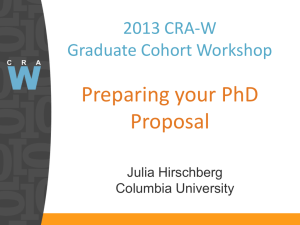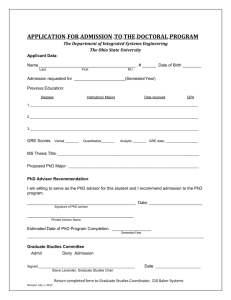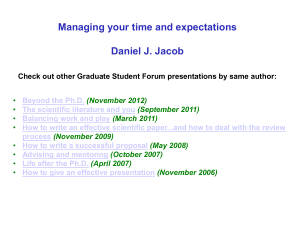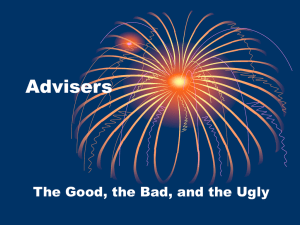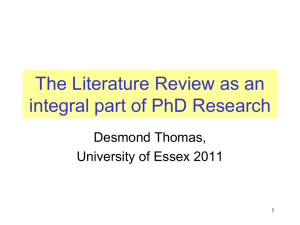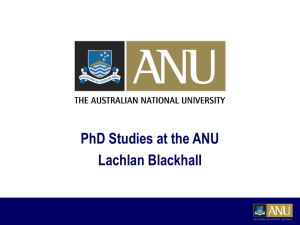Slides
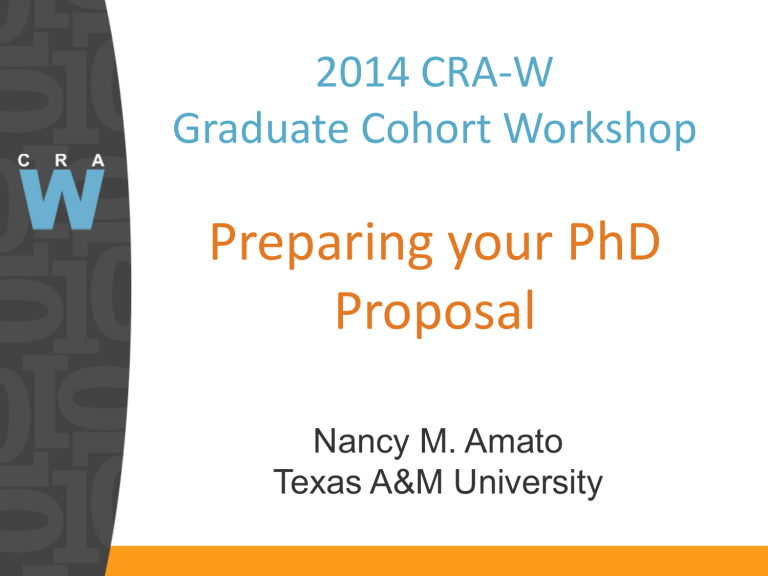
2014 CRA-W
Graduate Cohort Workshop
Preparing your PhD
Proposal
Nancy M. Amato
Texas A&M University
Nancy in one slide
•
PhD, U. Illinois, 1995
•
Texas A&M faculty 1995-present
• s tarted as asst prof, currently Interim Dept
Head
• Group: 4 postdocs, 13 PhD, 8 MS, 9 ugrad
• Graduated 13 PhDs (7 profs, 3 research labs,
2 postdocs, 1 startup)
•
Research
•
Algorithms, Robotics, HPC, Computational
Biology, Geometry, …
•
Non-Work Stuff
•
Husband Lawrence (also CSE Prof at Texas
A&M) and several dogs
•
For fun: travel, gardening, reading, eating
Format of this Session
• Interactive
– Asking audience for answers to questions
– Ask questions anytime
What is a PhD Proposal really?
• A brainstorming and planning process
• A succinct writeup of your proposed research goals, strategies, justification, contributions
• A good time to get feedback and direction from experts
• Sometimes a stressful period of graduate school
Why write a PhD Proposal?
• An important, required step towards graduation!
• Focus your research direction
– Writing can clarify your thoughts
• Establish contact with committee
• Obtain feedback from committee
• Side effect: Proposal writing experience
The Proposal Process in 1 slide
• Select your committee with your advisor
– Get them on board
– Get defense date
• Write proposal iterating with advisor: the proposal will be a contract with your committee
• Give proposal to committee
• Prepare presentation of proposal
– Practice several times
– Get the timing down
• Prepare for hard questions – reread proposal as committee member
• Present and defend proposal
– Reviseproposal based on feedback & formally submit
• Celebrate this big milestone!
– Thank committee, meet with advisor (and committee members) to discuss questions and directions
• Move forward on research!!
How long should a proposal be?
• Check your department & Universitt rules
– Texas A&M: at most 10 pages
• Some do 2 versions, one for committee and one for university
– Columbia: 30pp – no more
– Others may be shorter
What is the role of the Committee?
• Throughout the process …
– Guidance and understanding of what to expect
– Feedback
– Eventually, reference letters
• At the proposal
– Make sure you know what you’re talking about
– Make sure you know the previous literature
– Make sure you know the tough issues and have some answers
– Make sure your plan is reasonable
Selecting the PhD Committee
• Know your department & University rules
• Ideally
– PhD advisor(s)
– Faculty in the topic area to provide useful direction
– Faculty outside topic to provide high level feedback
– External member – someone in research area who could write a ref letter
Proposal Presentation Tips
• Attend others’ proposal defenses in your area
• Thank committee, introduce yourself and background
• Practice presentation many times
• Be polite during interruptions with questions
• Have someone take notes of questions
• Be open to suggestions
• Prepare for questions
• Don’t be afraid to have no answer for a question.
Ask for direction/help on those questions.
• Be confident. Don’t look to advisor for answers.
Challenges, Frustrations,
Misconceptions
• “The proposal is just a hurdle. I can just propose ideas off the top of my head now and then figure out what I really want to do later.” – the lazy path
• “How can I propose something when I don’t know the details yet?” – the unknown path
• “I don’t know how to organize the different parts of the research on the page.” – writer’s block
• “I’m not ready yet. I might as well solve the problems and then present them.” – postpone, postpone, postpone….
What does a good Proposal
Accomplish?
The proposal should clearly answer:
• What is the problem you are studying?
• Why is it important?
• What results have you achieved so far and why to they matter?
• How is this substantially different from prior work?
• How will you systematically evaluate your work?
• What do you need to do to complete your work?
• What is your timeline?
When is the best time to write/present a Proposal?
• When you’ve completed the rest of your requirements
• When you have a clear idea of the problem you want to solve
• When you have some preliminary work done to demonstrate promise of your approach
• When you have some notion of the major subproblems to be solved
• When your advisor recommends
What to do before I start writing?
• Think about what YOU want to accomplish
• Write a succinct thesis statement/hypothesis
• Discuss your ideas with others
• Present parts of the research at seminars, workshops, PhD workshops, conferences
• Think about 3-4 major contributions/papers
• Formulate these contributions in writing
How do I get started writing?
• Look at examples in your department, with same advisor, in your area
• Breadth of project proposed
– Separation into subprojects
– Writing style: problem statement, hypothesis
– Organization
• Overall outline and flow
• Within each proposed project section
– How they motivated their topic and foreseen contributions
Think about the Audience
• Your Committee
– Not necessarily all in your general topic area
– Not familiar with your specific problem
– Not aware of your prior work
– Not aware of your skills, infrastructure
• Implications
– Background: terminology, problem,…
– State of the art related to your problem
– Convincing motivation for importance
– Demonstration of feasibility/promise of success
– Is a starting point for your dissertation/thesis
How to organize a proposal?
• Introduction
– Problem statement and importance
• Background and State of the Art
• Proposed Research
– Subsections on each research contribution
• Evaluation Plans
• Research Plan
• Summary of your Contributions and
Timeline
The Introduction
• General, high level problem for people outside area to appreciate
• Quick overview of what state of the art does not address
• Thesis statement – specific open problem and proposed strategy
• Brief overview of key insights and why your approach is promising
• List of your likely contributions
Proposed Research
• Overview of project – maybe a figure
• Specific project in steps
• For each –
– Problem
– Strategy
– Details known now
– Plans for remaining challenges
– Evaluation plan
Evaluation Plans
• Experiment Design:
– Questions you will ask to judge success of your approach
– Independent variables – what is being varied/compared
• Eg, your technique versus other techniques
– Dependent variables and measures – what is being measured
• Effectiveness – precision and recall, f measure
• Cost – efficiency
– Human subjects?
– Methodology
• What actions are you going to perform to conduct the experiment?
Research Plan
• What steps do you plan to take next?
• What will you save for post-thesis work? Why?
Conclusion
• Summary of contributions to the state of the art – intellectual merit
• Repetition of broader impact on society
Sample Questions at
Proposal Defense
– Topic too large? too small? doable in the timeframe?
Focused? What problems haven’t you foreseen?
What happens if your planned experiments fail
(backup plans)?
– Evaluation (plan, statistics, validity)
– Related work missing?
– Practicality/scalability
– Vision of where this can go…
– Certain people have go-to questions
• Watch your committee members on other proposal defenses
• Especially if your thesis touches on work they have done or know a lot about
• Ask your advisor
Open Discussion
• Questions?
• Concerns?
